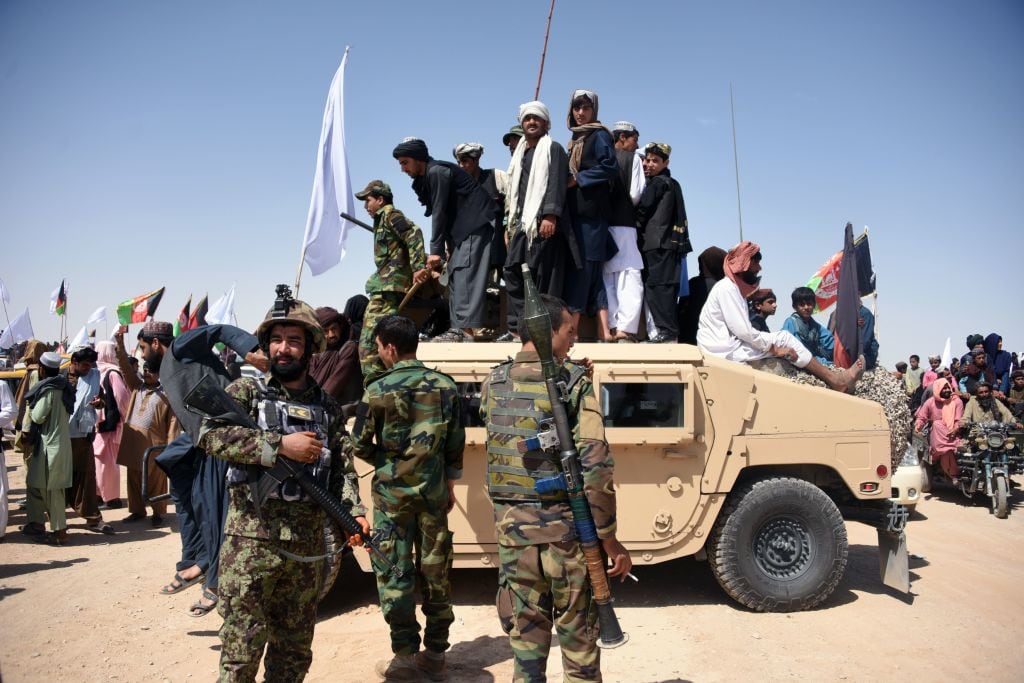Six main factors led to the collapse of the Afghan government as the U.S. drew down its last troops in the country, according to a report released Wednesday. Chief among them was key Afghan officials’ refusal to believe the U.S. would keep its promise to leave the country.
That’s the conclusion from a report by the Special Inspector General for Afghan Reconstruction, commissioned by Congress after Afghanistan’s fall to the Taliban in August 2021.
“Even as the United States officially expressed its desire to exit Afghanistan in the years leading up to its departure, contradictory messaging by U.S. officials undermined efforts to convey the seriousness of U.S. intentions to Afghan officials, who optimistically believed that alternative scenarios were possible,” the report found.
So, as President Joe Biden’s September deadline drew nearer, the report continues, “The result was that the Afghan government was fundamentally unprepared to manage the fight against the Taliban as the United States military and its contractors withdrew.”
The State Department’s response to SIGAR’s findings refutes that claim, calling into question whether the report evaluated the U.S.’s role in both Afghanistan’s reconstruction and its conduct during the withdrawal properly.
“Around the world, the United States aids in combatting corruption, advocates for representative government, and supports accountability mechanisms among the various initiatives based on democratic values and human rights,” Erik Schnotala, acting director of State’s Office of Afghanistan Affairs, wrote in his review of the report.
“Whether a country is successful or not in making progress in these areas is ultimately a reflection its own efforts,” he added.
The other top two reasons for the fall of Afghanistan’s democratically elected government had more to do with the way the U.S. chose to negotiate its exit.
That negotiation came in a series of talks with Taliban leaders that excluded the Afghan government as a stakeholder, the second primary issue. That was at the Taliban’s request, the report points out, but the U.S. hoped that settling with the Taliban would be a starting point to fulfilling the Afghan government’s wish that the Taliban be integrated into its governing structure ― the third issue.
“Instead, the Taliban reinvigorated its battlefield campaign against the Afghan government, which was weakened by its exclusion from U.S.-Taliban talks and the perception that the United States was withdrawing its support,” according to the report.
In some ways, these good-faith efforts might not have mattered, the report found, because the fourth reason for the fall was that the Taliban wasn’t really interested in compromising.
After negotiating a drawdown timeline with the U.S., the Taliban turned its efforts to beating down Afghan national forces.
“By April 2021, a U.S. intelligence community assessment had concluded that ‘the Taliban is confident it can achieve military victory,’ " according to the report. “Over the next 2 months, the Taliban’s offensive accelerated as the insurgency rapidly gained control of half of Afghanistan’s 419 districts. On August 15, 2021, Kabul fell.”
Reasons five and six dealt more specifically with the Afghan government and the way it was run.
RELATED

For example, President Ashraf Ghani, who fled Kabul as the Taliban marched in, was seen as insular and “undiplomatic,” governing with a small group of loyalists and dealing harshly with any rivals.
“The president’s political and social isolation appears to have been a function of both his personality and his desire to centralize and micromanage policy implementation,” according to the report.
This undermined any support that other Afghan powerbrokers might have provided to the government and limited the amount of information Ghani received about what was going on in the country.
“The net effect was a leader who was largely ignorant of the reality confronting the country he led, particularly just prior to the Republic’s collapse,” the report found.
That environment led to the sixth and final reason for the fall: The Afghan government was so centralized and fraught with “endemic corruption” that there was little understanding of how the country was being run in far-flung rural areas, the places the Taliban took first.
“By investing so much power in the executive, Afghanistan’s political system raised the stakes for political competition and reignited long-running tensions between an urban elite eager to modernize and a conservative rural populations distrustful of central governance,” the report found.
US failures — disputed
The SIGAR also looked into whether the U.S. met its own objectives in the Afghanistan reconstruction efforts, finding that while the U.S. made incremental progress in helping establish a stable government, it never approached self-sustaining.
Except, in some ways, the Taliban has tried to keep the former government functioning.
“For example, although the Taliban have dissolved several ministries of the former government, the Afghan ministries of finance, health and economy, as well as the country’s central bank, have continued to execute some basic functions,” the report found. “Moreover, although the Taliban have installed their own members in many leadership positions, they have largely kept lower-ranking civil servants in their jobs.”
RELATED

The State Department, in its response to the SIGAR report, was less than pleased with the findings.
“First, SIGAR’s report notes that American officials delivered mixed messages regarding U.S. intentions,” wrote Schnotala, the State Department official. “President Biden is the third American President in succession to express interest in bringing American forces home from Afghanistan.”
In February 2020, the Trump administration negotiated a withdrawal agreement with the Taliban and established May 1, 2021, as the date for the final withdrawal. The administration then began drawing down U.S. troops, from 13,000 to 2,500. After the 2020 election, President Biden delayed the final withdrawal until the end of August 2021. Throughout all of this time, however, the Taliban continued to attack Afghan government forces and failed to live up to the terms of the agreement.
Communications between the Biden and Ghani governments “made clear” that the U.S. intended to fully withdraw, Schnotala wrote.
“With this in mind, the standard by which the U.S. government succeeded or failed in its political objectives in Afghanistan needs to be wholly reconsidered in this report,” he added.
Meghann Myers is the Pentagon bureau chief at Military Times. She covers operations, policy, personnel, leadership and other issues affecting service members.





